The Link Between Stress, Cortisol, and Memory Loss
Introduction
We’ve all been there: you’re juggling work deadlines, relationship pressures, and a never-ending to-do list — when suddenly, your brain just… stops cooperating. You forget where you put your keys, blank out on a conversation from yesterday, or can’t recall a word that’s on the tip of your tongue.
It’s frustrating, but there’s a reason this happens — and it has less to do with “getting older” and more to do with stress. Chronic stress floods the body with a hormone called cortisol, which, over time, can actually disrupt your memory, focus, and brain function.
In this article, we’ll explore how stress hijacks your brain chemistry, how cortisol impacts memory at a biological level, and what you can do — naturally — to protect your brain and rebuild cognitive resilience.
Looking for supplements for Memory And Focus? Click here.
🌪️ What Happens to the Brain Under Stress

Stress isn’t always bad. In small, short bursts, it can actually sharpen your focus and help you perform under pressure — a survival mechanism dating back to our ancestors’ need to respond to danger.
When your brain perceives a threat (physical or emotional), it activates the HPA axis — the hypothalamic-pituitary-adrenal system. This triggers your adrenal glands to release cortisol and adrenaline, preparing your body to “fight or flee.”
You may notice:
Faster heartbeat
Heightened alertness
Quickened breathing
A rush of energy
This response is adaptive and protective in the short term. But when stress becomes chronic — from constant deadlines, emotional strain, or lack of rest — cortisol remains elevated for too long. That’s when it turns from helpful to harmful.
🧬 What Is Cortisol and Why Does It Matter?
Cortisol is often called the “stress hormone”, but it’s not inherently bad. In fact, it plays many vital roles, including:
Regulating metabolism
Balancing blood sugar
Reducing inflammation
Helping with energy production
Influencing memory formation
However, cortisol is meant to rise and fall rhythmically throughout the day. Levels peak in the morning (to wake you up) and drop at night (to allow relaxation and sleep).
When stress becomes chronic, cortisol stays consistently high, disrupting this natural rhythm — and your brain is one of the first organs to suffer.
🧠 Cortisol’s Direct Effect on Memory
The brain is incredibly sensitive to hormonal changes, especially in areas responsible for learning and memory — the hippocampus and prefrontal cortex.
Cortisol Shrinks the Hippocampus
The hippocampus is your brain’s memory center, responsible for encoding new information and retrieving old memories. Research shows that prolonged exposure to high cortisol levels actually causes hippocampal neurons to shrink and die.
Over time, this results in:
Difficulty forming new memories
Poor recall of existing information
Shorter attention span
A study published in Nature Reviews Neuroscience found that individuals with chronically elevated cortisol levels had smaller hippocampal volumes, correlating with impaired memory performance.
Cortisol Disrupts Neurotransmitters
Cortisol also interferes with the brain chemicals that regulate mood and cognition — particularly serotonin, dopamine, and acetylcholine.
When these neurotransmitters become imbalanced, you may experience:
Brain fog
Low motivation
Difficulty concentrating
Depressive thoughts
This chemical disruption makes stress not just a mental state, but a biochemical storm that sabotages cognitive function.
Cortisol Inhibits Neurogenesis
Your brain has the ability to create new neurons — a process called neurogenesis. This occurs primarily in the hippocampus and is essential for learning and adaptability.
Chronic stress suppresses neurogenesis, meaning your brain’s ability to renew and rewire itself slows down. This can make it harder to recover from burnout, emotional trauma, or cognitive fatigue.
Cortisol and the Prefrontal Cortex
The prefrontal cortex (PFC) is the part of the brain that manages executive functions — focus, planning, and impulse control. High cortisol weakens the PFC, leading to poor decision-making, distractibility, and irritability.
This is why under stress you might:
Forget appointments
Lose track of tasks
Struggle to focus on reading
Make impulsive choices
Meanwhile, stress strengthens the amygdala — the brain’s fear center — making you more reactive and anxious, perpetuating the cycle.
⏳ Chronic Stress and Cognitive Decline
While short-term stress fades, chronic stress creates lasting brain changes. Over time, high cortisol contributes to:
Accelerated brain aging
Increased risk of Alzheimer’s and dementia
Higher oxidative stress and inflammation
Reduced glucose metabolism in neurons
In one landmark study from the University of California, older adults with consistently high cortisol levels performed worse on memory tests and had measurable hippocampal shrinkage.
The takeaway: managing stress isn’t just about feeling calm — it’s about preserving your memory and long-term brain health.
⚖️ The Stress–Cortisol–Memory Loop
To understand why stress has such a strong grip on memory, imagine it as a loop:
Stressful event occurs.
→ Cortisol rises to prepare your body.
Cortisol floods the brain.
→ Short-term alertness increases, but focus narrows to the stressor.
Memory processing slows.
→ The hippocampus gets less blood flow, impairing recall and storage.
You feel anxious about forgetting.
→ Which triggers more stress, raising cortisol again.
This creates a self-reinforcing cycle that can persist for weeks or months unless interrupted by rest, recovery, or stress-regulating strategies.
🩺 Symptoms of Cortisol-Driven Memory Loss
If you’ve been living under chronic stress, you may notice signs like:
Difficulty remembering names, dates, or conversations
Trouble learning new information
Forgetting why you entered a room or what you were doing
Brain fog, especially in the afternoon
Poor sleep and vivid or restless dreams
Feeling mentally “fried” even after resting
These are often early signs of cortisol dysregulation, which — if ignored — can evolve into chronic fatigue, depression, or long-term cognitive decline.
🌿 The Science of Recovery: How to Lower Cortisol Naturally
The good news? The brain is resilient. Even after prolonged stress, it can regrow and rewire itself once cortisol levels normalize.
Here’s how to restore balance through evidence-backed nutrition, supplementation, and lifestyle habits:
🥗 Nutrition for Cortisol and Brain Health
Food directly impacts cortisol regulation and neurotransmitter balance. Focus on:
✅ Omega-3 Fatty Acids
Found in fish oil, flaxseed, and algae oil, omega-3s reduce inflammation and improve neuron communication. Studies show they can reverse stress-induced hippocampal damage and support mood stability.
✅ Magnesium
Known as the “anti-stress mineral,” magnesium regulates the nervous system and GABA activity, calming overactive neurons. Deficiency has been linked to anxiety and memory impairment.
✅ B Vitamins (B6, B9, B12)
These support neurotransmitter synthesis and help break down homocysteine, a compound that damages brain cells when elevated by stress.
✅ Antioxidants
Foods rich in vitamin C, vitamin E, and polyphenols (like blueberries, green tea, and turmeric) protect against oxidative damage from chronic cortisol exposure.
🧘 Lifestyle Habits That Balance Cortisol
Your brain responds dynamically to your daily habits. Here’s what helps:
🌞 Sleep Consistency
Cortisol and melatonin work in opposite rhythms. Poor sleep keeps cortisol high, impairing memory consolidation. Aim for 7–9 hours and maintain regular bedtimes.
🧘 Mindfulness and Breathwork
Deep breathing activates the parasympathetic nervous system, lowering cortisol within minutes. Try the 4-7-8 breathing technique:
Inhale for 4 seconds
Hold for 7
Exhale for 8
Practices like yoga, meditation, or even walking in nature reduce amygdala activity — calming your body and protecting your hippocampus.
Want to try Breathwork? Click Here.
💪 Exercise (But Not Too Much)
🌿 Natural Supplements for Stress and Memory
Certain adaptogens and nootropics help regulate cortisol while protecting the brain from its effects.
🧠 Ashwagandha
An adaptogenic herb proven to lower cortisol by up to 30% in human trials. It improves sleep, reduces anxiety, and enhances memory performance.
🧩 Rhodiola Rosea
Supports adrenal function and increases resistance to mental fatigue. Studies show it reduces stress-induced burnout and improves focus.
🍄 Lion’s Mane Mushroom
Stimulates nerve growth factor (NGF) and promotes neurogenesis, helping reverse stress-related damage to neurons.
🌼 Phosphatidylserine
A natural phospholipid that helps normalize cortisol levels, improve focus, and protect cell membranes from stress.
💊 L-Theanine
Found in green tea, this amino acid promotes calm alertness and lowers stress without sedation by increasing alpha brain waves.
Moderate physical activity (like brisk walking or strength training) lowers baseline cortisol and improves cognitive flexibility.
However, overtraining can raise cortisol, so recovery is just as important.
💬 Social Connection
Meaningful relationships and laughter release oxytocin, which directly lowers cortisol. Isolation has the opposite effect, increasing stress hormones and cognitive decline risk.
🧬 How Cortisol Impacts Short-Term vs. Long-Term Memory

Cortisol affects two main types of memory differently:
🕐 Short-Term (Working) Memory
High cortisol impairs working memory, making it harder to hold information temporarily — like recalling a phone number or task list.
🕰️ Long-Term Memory
While short-term stress can enhance memory encoding (e.g., remembering a stressful event), chronic stress disrupts retrieval — meaning you store the information but can’t access it efficiently later.
This explains why people under stress often “blank out” during exams, speeches, or interviews: their recall mechanism temporarily falters.
🧘 Restoring Balance: The Path to a Calmer, Sharper Mind
Reducing cortisol isn’t about eliminating all stress — that’s impossible. It’s about regaining control of your body’s stress response, so your brain can recover and function optimally.
Here’s how to build a daily rhythm that supports both calm and cognition:
| Time | Action | Effect on Cortisol |
|---|---|---|
| Morning | Get sunlight within 30 minutes of waking | Regulates circadian rhythm |
| Midday | Eat a balanced meal with protein & omega-3s | Stabilizes blood sugar, prevents spikes |
| Afternoon | Take a 10-minute walk or breathing break | Prevents cortisol buildup |
| Evening | Wind down with magnesium or ashwagandha tea | Supports relaxation and memory consolidation |
| Night | Keep screens dim and cool bedroom | Improves melatonin, lowers cortisol naturally |
💡 The Good News: Cortisol Damage Isn’t Permanent
One of the most remarkable findings in neuroscience is that the brain can heal. Even if stress has affected your memory, it’s possible to reverse much of the damage.
🧠 Neuroplasticity to the Rescue
When cortisol levels decrease, the hippocampus can regrow neural connections and even generate new neurons. This process, called neuroplasticity, is enhanced by physical exercise, mental stimulation, and nutrition.
🌱 The Role of Mindful Recovery
Simple restorative habits — like consistent sleep, creative hobbies, and gratitude journaling — can rewire the brain for calmness, reducing the likelihood of cortisol spikes.
⚕️ When to Seek Professional Support
If you experience prolonged memory issues, chronic fatigue, or unrelenting stress, it’s wise to consult a healthcare provider. Functional tests can measure:
Cortisol rhythm (via saliva or urine)
Nutrient deficiencies
Thyroid and adrenal health
Working with a professional can help tailor a plan that includes nutritional therapy, supplements, and stress management suited to your unique physiology.
🧩 Summary: The Stress–Cortisol–Memory Connection
| Mechanism | Effect on Brain | Result |
|---|---|---|
| High cortisol | Shrinks hippocampus | Forgetfulness, poor recall |
| Neurotransmitter imbalance | Reduces serotonin & dopamine | Brain fog, low motivation |
| Chronic stress | Suppresses neurogenesis | Harder to learn or recover from burnout |
| Inflammation | Damages neurons | Cognitive aging, fatigue |
| Sleep disruption | Prevents memory consolidation | Weakened focus and retention |
When stress becomes chronic, it can feel like your brain is “offline.” But by managing cortisol naturally — through nutrition, mindfulness, movement, and supplements — you can reclaim your cognitive clarity and emotional balance.
🌤️ Final Thoughts
Your memory is not fixed — it’s dynamic, alive, and constantly evolving with your daily habits. Chronic stress may cloud it, but the right tools can help you bring it back into focus.
By supporting your nervous system, nurturing your body with the right nutrients, and cultivating calm through breath and presence, you’re doing more than reducing stress — you’re giving your brain the space to remember, create, and thrive.
Cortisol may be the “stress hormone,” but you have the power to retrain it — and in doing so, strengthen your most powerful ally: your mind. 🌿
Related Posts
-

Nootropics That Promote Calm and Rest
Explore the world of calming nootropics — natural brain enhancers that promote relaxation, better focus, and deeper rest. Learn how L-Theanine, magnesium, ashwagandha, and other adaptogens help balance your nervous system, reduce stress, and support restorative sleep.
-

Best Natural Supplement Stack for Sleep
Discover the best natural supplement stack for deep, restorative sleep. Learn how nutrients like magnesium, L-theanine, glycine, and calming herbs such as chamomile and ashwagandha work together to relax your body, calm your mind, and improve sleep quality—naturally and safely.
-

Combining L-Theanine and Magnesium for Sleep: A Calm Night, Naturally
Discover how combining L-Theanine and Magnesium can help you drift into deep, restorative sleep. Learn how this natural duo calms the mind, relaxes the body, and supports your nervous system—without grogginess the next morning.
-

How to Sleep Better After Intense Workouts
Struggling to fall asleep after a tough workout? Learn how to optimize your post-training recovery with nutrition, hydration, and science-backed sleep strategies. Discover how to calm your nervous system, balance hormones, and wake up fully recharged for your next session.
-

Ashwagandha and Valerian: A Bedtime Combo for Deep Rest and Emotional Reset
Discover the calming synergy of Ashwagandha and Valerian root, two natural sleep aids that help quiet the mind, ease anxiety, and promote deeper rest. Learn how this herbal duo supports the nervous system, balances stress hormones, and restores emotional peace — without next-day grogginess.
-

How to Create a Resilience-Boosting Diet
Discover how to build emotional and physical strength from the inside out with a resilience-boosting diet 🍎. Learn which foods stabilize your mood, how supplements like magnesium and omega-3s strengthen your stress response, and why pairing nutrition with breathwork and therapy creates lasting calm, focus, and vitality 🌿💪.
-

Best Teas and Herbal Blends for Calmness: Nature’s Way to Restore Inner Peace
Ashwagandha, the ancient adaptogenic herb, helps your body find balance during stress. Known as “Indian ginseng,” it supports cortisol regulation, boosts energy, and restores calm clarity. Discover how this powerful root promotes resilience, emotional balance, and steady vitality — one cup at a time. 🌸
-

Parenting and Emotional Strength: How to Raise Children Without Losing Yourself
Empathy is the bridge that connects hearts — the quiet power to understand, feel, and support another’s emotions without judgment. Learn how empathy strengthens relationships, enhances communication, and cultivates deeper compassion in everyday life. 🌿
-

How to Bounce Back from Public Failure: Reclaiming Confidence, Purpose, and Power
Visualization is more than imagination — it’s brain training for resilience. By picturing calm, success, or healing, you activate the same neural pathways as real experience. Learn how daily visualization rewires your brain for confidence, emotional balance, and recovery from stress. ✨
-

Coping with Financial Stress Through Resilience: How to Stay Grounded When Money Feels Tight
Body awareness is the foundation of emotional resilience. By tuning into your body’s signals — tension, fatigue, or calm — you learn to recognize stress before it overwhelms you. Discover how mindfulness, gentle movement, and breathwork can deepen your connection with your body and restore balance from the inside out. 🧘
-

How to Stay Positive During Chronic Illness: A Guide to Emotional Strength and Hope
Creativity is more than art — it’s a form of healing. Whether through painting, writing, music, or small acts of expression, creativity helps release emotion, calm the nervous system, and reconnect you to joy. Discover how to use creativity as a tool for emotional balance, resilience, and self-discovery. 🌿
-

Resilience Tips for Caregivers: How to Stay Strong While Caring for Others
Joy isn’t the absence of pain — it’s the quiet strength to find light even in challenging times. Cultivating joy through small daily moments restores balance, releases stress, and reminds you of life’s beauty. Learn how to reconnect with authentic happiness, rebuild emotional energy, and nurture your nervous system through gratitude, presence, and play. 🌿
-

Building Resilience After a Breakup: How to Heal, Rebuild, and Rise Stronger
Social connection is one of the strongest predictors of emotional resilience. During difficult times, genuine relationships act as anchors — calming the nervous system, reducing stress hormones, and helping you regain perspective. Learn how cultivating real human connection can strengthen your mind, heart, and overall well-being. 🌿
-

How to Stay Emotionally Strong During Job Loss
Your emotions are powered by brain chemistry — a delicate balance of neurotransmitters like serotonin, dopamine, and cortisol. When these chemicals work in harmony, you feel calm, focused, and resilient. Learn how daily habits, nutrition, and mindfulness can support your brain chemistry and boost emotional well-being naturally. 🌿
-

The Role of Hormones in Emotional Stability: How Your Chemistry Shapes Your Calm
Hormones shape more than your body — they shape your emotions, resilience, and sense of calm. From cortisol to serotonin, these chemical messengers influence how you react to stress, connect with others, and recover from challenges. Learn how to balance your hormones naturally to build lasting emotional stability and harmony within. 💫
-

Mitochondria and Emotional Energy: The Cellular Power Behind Your Mood
Breathwork is one of the most powerful tools for emotional regulation and cellular balance. Through intentional breathing, you can calm your nervous system, increase oxygen flow to the brain, and even support mitochondrial energy. Learn how conscious breathing connects body and mind — transforming stress into presence and emotional strength. 🌿
-

Inflammation and Its Impact on Mood Resilience: The Silent Link Between Body and Mind
Inflammation doesn’t just affect the body — it impacts the mind. Chronic inflammation alters brain chemistry, depletes serotonin, and makes emotional recovery harder. Learn how calming inflammation through nutrition, mindfulness, and sleep can restore balance, resilience, and a renewed sense of emotional strength. 💫
-

How Antioxidants Protect Emotional Well-being: The Hidden Link Between Oxidative Stress and Mental Health
Antioxidants do more than protect your body — they defend your mind. By neutralizing oxidative stress, antioxidants support serotonin, dopamine, and brain energy pathways that keep you calm, focused, and emotionally balanced. Discover how foods like berries, green tea, and dark chocolate nourish your brain, boost mood, and strengthen resilience from the inside out. 🌿✨
-

The HPA Axis and Emotional Health: The Hidden Bridge Between Stress and Mind
Neuroplasticity — the brain’s ability to rewire and adapt — is the foundation of emotional healing and resilience. When you face stress, trauma, or change, your neural pathways can reshape themselves to support new patterns of calm, focus, and self-awareness. Learn how daily practices like mindfulness, therapy, and breathwork strengthen neuroplasticity to transform emotional pain into personal growth. 🌸
-

Why Cortisol Control Is Key to Resilience: Mastering Stress to Build Emotional Strength
Controlling cortisol — the body’s main stress hormone — is the secret to lasting resilience. When cortisol levels stay balanced, your mind becomes clearer, emotions steadier, and energy more sustainable. Learn how breathwork, mindset shifts, adaptogens, and daily rhythms can help you calm your stress response and build true inner strength. 🌞💪
-

Dopamine’s Influence on Motivation and Recovery: Reigniting Drive and Balance
Healthy relationships are the foundation of emotional balance and resilience. Whether romantic, familial, or platonic, genuine connection releases dopamine, serotonin, and oxytocin — the brain’s “bonding trio” — helping us feel secure, motivated, and seen. Learn how trust, empathy, and communication not only strengthen your connections but also reshape your nervous system for deeper emotional well-being. 🌿🤝
-

The Role of Serotonin in Resilience: How This “Mood Molecule” Shapes Emotional Strength
Serotonin — often called the “resilience molecule” — plays a vital role in how we handle stress, regulate mood, and recover from emotional challenges. Beyond happiness, this powerful neurotransmitter helps balance the gut-brain axis, stabilize the nervous system, and support emotional flexibility. Learn how nutrition, sunlight, mindfulness, and adaptogens can naturally boost serotonin and strengthen your emotional resilience. 🌞🧠
-

How Neuroplasticity Supports Emotional Growth: Rewiring the Brain for Resilience
Neuroplasticity is the brain’s built-in power to grow, adapt, and heal — and it’s the foundation of emotional transformation. Every mindful breath, compassionate act, or reframed thought strengthens new neural pathways that support resilience and self-awareness. Learn how your brain rewires through daily habits, helping you turn emotional challenges into opportunities for growth and calm. 🌿
-

Tai Chi and Adaptogens for Mind-Body Balance: The Art of Harmonizing Energy and Resilience
Alchemy isn’t just an ancient science — it’s a timeless symbol of transformation and inner balance. By blending the physical and spiritual, alchemy teaches us that change begins from within. Just as metals are refined into gold, we too can transmute emotional pain, stress, and chaos into clarity and strength through mindful practice and self-awareness. 🌙✨
-

Cold Therapy and Emotional Control: Training the Mind Through the Body
Cold therapy isn’t just for athletes — it’s a tool for emotional mastery. By exposing your body to controlled cold, you train your nervous system to stay calm under stress, improving focus, mood, and resilience. This article explores the science of cold exposure, its impact on hormones and the vagus nerve, and how ice baths and cold showers can help you build emotional control, one breath at a time. 🧊🧘♂️
-

How Music Influences Emotional Recovery: The Healing Soundtrack of the Mind
Neuroplasticity — the brain’s ability to rewire and heal itself — is at the heart of emotional recovery. Through mindful habits, music, therapy, and consistent mental stimulation, your brain can form new connections that support resilience and well-being. Discover how neuroplasticity turns pain into growth, helping you rebuild balance, focus, and emotional strength. 🌿
-

Nature Therapy for Building Resilience: Reconnecting With the Healing Power of the Earth
Nature therapy helps rebuild emotional resilience by reconnecting you with the healing rhythms of the Earth. From forest walks to sunlight exposure, nature restores balance to your nervous system, lowers stress hormones, and teaches emotional adaptability. Learn how spending time outdoors can enhance mental clarity, calm anxiety, and awaken your natural capacity to heal. 🌞
-

Breathwork Techniques That Pair with Supplements: The Ultimate Synergy for Stress Relief and Mental Clarity
Breathwork and supplements create a powerful mind-body synergy for stress relief, focus, and energy. By combining intentional breathing with adaptogens, nootropics, and calming nutrients, you can naturally regulate cortisol, sharpen mental clarity, and boost emotional balance. This guide explores the best breathwork techniques and supplement pairings to help you feel centered, calm, and energized from the inside out. 🌿
-

Why Cortisol Balance Matters for Emotional Strength
Balancing cortisol — your body’s main stress hormone — is essential for emotional resilience. When cortisol is chronically high, your mind stays stuck in survival mode, leading to fatigue, anxiety, and emotional instability. This article explores how nutrition, supplements, breathwork, and therapy can help restore healthy cortisol rhythms, regulate the nervous system, and strengthen your ability to handle life’s challenges with calm focus and emotional strength. 🌿
-

Best Supplements for Students During Exam Season: Focus, Energy, and Memory Support
Studying late into the night? Learn which natural supplements can boost focus, memory, and mental stamina during exam season — without the crash. From omega-3s to Bacopa and Rhodiola, discover your brain’s ultimate exam support stack. 🎓🧠
-

Natural Memory Boosters for Seniors: How to Keep Your Mind Sharp and Focused
Stay mentally sharp and confident as you age. Discover science-backed natural supplements and lifestyle habits that boost memory, focus, and brain longevity for seniors. 🌿🧠
-

How to Build a Daily Supplement Routine for Memory Health
Want to sharpen your memory and stay mentally clear? Learn how to build a daily supplement routine for memory health — from morning focus to nighttime brain repair. Discover science-backed nutrients that boost recall, focus, and long-term cognitive resilience. 🧠🌿
-

Top 5 Natural Supplements for Memory Recall and Focus
Looking to boost memory and concentration naturally? Discover the top 5 supplements — Bacopa, Ginkgo Biloba, Lion’s Mane, Rhodiola, and Phosphatidylserine — that enhance focus, recall, and long-term brain health. 🧠✨
-

Top Supplements to Balance Mood Naturally
From omega-3s to adaptogens, discover the top natural supplements proven to support emotional balance, reduce stress, and promote inner calm — safely and effectively. 🌿✨
-
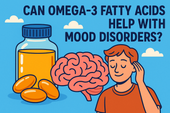
Can Omega-3 Fatty Acids Help with Mood Disorders?
Omega-3 fatty acids do more than support heart health — they can help balance mood, reduce depression, and calm anxiety. Discover how EPA and DHA nourish your brain, fight inflammation, and support emotional well-being from within. 🌊🧠
-

Vitamin D and Mood: The Sunshine Vitamin for Emotional Balance
Could the key to emotional balance be as simple as a little sunlight? Discover how vitamin D — the sunshine vitamin — influences serotonin, reduces inflammation, and helps you feel more positive and resilient year-round. ☀️💛
-

The Role of Magnesium in Reducing Irritability and Low Mood
Feeling on edge or emotionally drained? Magnesium could be the missing link between your body and your mood. Discover how this essential mineral reduces irritability, balances neurotransmitters, and helps your nervous system find calm again. 🌿✨
-
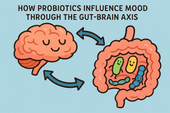
How Probiotics Influence Mood Through the Gut-Brain Axis
Discover how probiotics can do more than support your digestion—they can actually uplift your mood. This article explores the fascinating gut-brain axis and how balancing your gut bacteria through probiotics may help reduce anxiety, improve emotional stability, and support long-term mental well-being. 🌿🧠
-
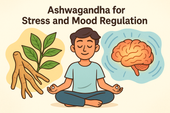
Ashwagandha for Stress and Mood Regulation
Discover how Ashwagandha, the powerful adaptogenic herb 🌿, helps your body manage stress and regulate mood. Learn how it balances cortisol, boosts GABA and serotonin, and supports emotional stability — helping you feel calm, focused, and resilient every day.
-

St. John’s Wort: Natural Support for Mild to Moderate Depression
Discover how St. John’s Wort, the “sunshine herb” 🌼, naturally supports mild to moderate depression. Learn how it boosts serotonin, balances mood, and promotes emotional resilience — with research showing its effectiveness compares to antidepressants, but with fewer side effects.
-
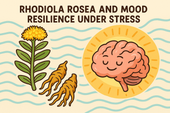
Rhodiola Rosea and Mood Resilience Under Stress
Discover how Rhodiola rosea helps your body adapt to stress 🌿. Learn how this powerful adaptogen balances cortisol, supports serotonin and dopamine, and strengthens emotional resilience — helping you stay calm, focused, and energized under pressure.
-

Chamomile and Lavender: Herbal Calm for Emotional Fluctuations
Discover how chamomile and lavender bring calm to emotional ups and downs 🌿. Learn how these two soothing herbs balance your nervous system, ease anxiety, and support restful sleep — naturally helping you find peace and emotional stability.
-
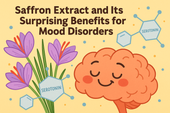
Saffron Extract and Its Surprising Benefits for Mood Disorders
Discover how saffron extract — the golden spice of joy 🌸 — can naturally support mood balance, ease anxiety, and lift mild depression. Learn what science says about its serotonin-boosting power, the ideal dosage, and how this ancient remedy compares to modern antidepressants.
-
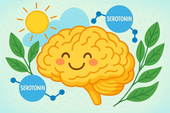
5-HTP and Serotonin: A Natural Path to Lifting Mood
Discover how 5-HTP naturally boosts serotonin 🌞 — the neurotransmitter behind mood, sleep, and emotional balance. Learn how this plant-derived compound supports happiness, reduces anxiety, and improves rest by helping your brain create more serotonin the gentle, natural way.
-
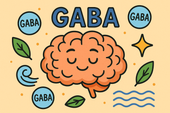
GABA Supplements for Reducing Anxiety and Mood Swings
Discover how GABA supplements can help reduce anxiety and balance mood naturally 🌿. Learn how this calming neurotransmitter works to quiet the mind, ease stress, and improve sleep — plus which nutrients and habits can boost your body’s own GABA production for long-term emotional stability.
-
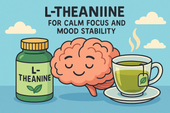
L-Theanine for Calm Focus and Mood Stability
Discover how L-theanine, the calming compound found in green tea 🍵, promotes focus, relaxation, and mood stability. Learn the science behind how it balances neurotransmitters, reduces stress hormones, and enhances clarity — helping you stay centered, calm, and productive without sedation.
-
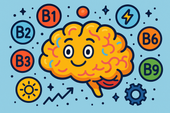
B Vitamins and Brain Chemistry: Supporting Energy and Emotional Balance
Discover how B vitamins power your brain chemistry ⚡. Learn how B6, B9, and B12 support serotonin, dopamine, and energy production — helping boost focus, mood, and emotional balance. From diet to supplements, explore how this vital nutrient group keeps your mind resilient and your energy steady.
-

N-Acetyl Cysteine (NAC) and Mood Disorders: What the Research Says
Learn how N-Acetyl Cysteine (NAC) supports brain health and mood balance 🧠. Discover how this antioxidant helps reduce oxidative stress, regulate glutamate, and improve emotional stability in depression, bipolar disorder, and anxiety — backed by cutting-edge psychiatric research.
-

Supplements for Bipolar Disorder: What May Support Stability
Discover the best supplements for bipolar disorder 🌿 that may support emotional stability and brain health. Learn how nutrients like omega-3s, magnesium, vitamin D, and NAC can help reduce inflammation, balance neurotransmitters, and complement traditional treatment safely.

















































